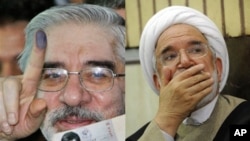In Iran, April 1 is designated Islamic Republic Day, commemorating the official establishment of the Islamic government in 1979, following the Iranian revolution that overthrew the Shah, and a vote by the Iranian people supporting the change to their form of government.
In its commemorations, the Iranian regime likes to point to the slogan popular during the revolution -- "Independence, Freedom, the Islamic Republic" -- as embodying the spirit and the will of the Iranian people from those days to the present.
But 32 years later, it is hard to juxtapose the words "Freedom" and "The Islamic Republic." As protests against autocratic governments continue throughout the Middle East, Iran's leaders carry on a brutal repression of any and all whom they regard as challenges to their entrenched power.
Cases in point: In February, government security forces placed under house arrest Iran's two top opposition leaders – Mir Hossein Mousavi and Mehdi Karroubi, along with their wives. The four have been cut off from all communication with the outside world.
When Mir Hossein Mousavi's father, Mir Esmail Mousavi, died on March 30, at least seven opposition activists were arrested at his funeral.
Hundreds of political prisoners, including journalists, lawyers, human rights defenders, women's rights activists and labor leaders languish in terrible conditions in Iranian prisons. Executions of political prisoners on unfounded charges after summary trials are skyrocketing.
The human rights violations, sustained lack of cooperation with U.N. mechanisms, and lack of freedom in Iran are so severe the United Nations Human Rights Council voted in March to establish a Special Rapporteur to investigate and report on the abuses in the country.
President Barack Obama recently spoke of the changes taking place in the Middle East and of the region's obvious yearning for freedom and accountable governance:
"There are places, like Egypt, where this change will inspire us and raise our hopes. And then there will be places like Iran, where change is fiercely suppressed."
But making a prediction assuredly unwelcome to the current leaders of Iran or any other authoritarian state, President Obama said, "This movement of change cannot be turned back ... a new generation is refusing to be denied their rights and opportunities any longer." And, he added, "Wherever people long to be free, they will find a friend in the United States."
The Islamic Republic After 32 Years

Thirty-two years later, it is hard to juxtapose the words "Freedom" and "The Islamic Republic."



